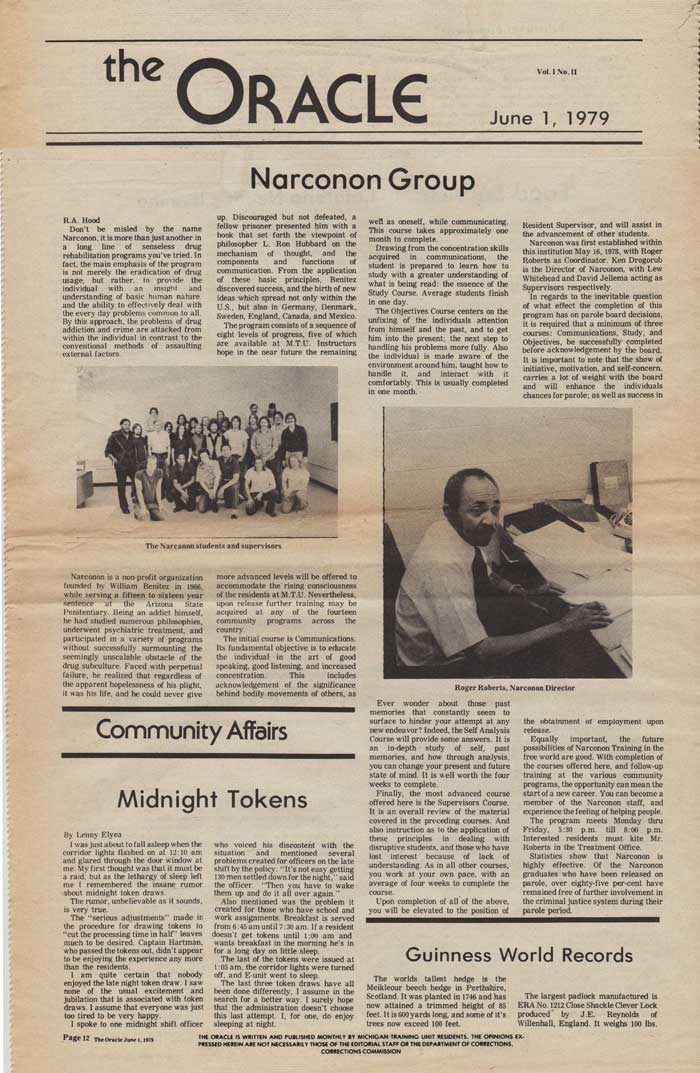Narconon Group

Narconon Group
Don’t be misled by the name Narconon, it is more than just another in a long line of senseless drug rehabilitation programs you’ve tried. In fact, the main emphasis of the program is not merely the eradication of drug usage, but rather, to provide the individual with an insight and understanding of basic human nature and the ability to effectively deal with the every day problems common to all. By this approach, the problems of drug addiction and crime are attacked from within the individual in contrast to the conventional methods of assaulting external factors.
Narconon is a non-profit organization founded by William Benitez in 1966, while serving a fifteen to sixteen year sentence at the Arizona State Penitentiary. Being an addict himself, he had studied numerous philosophies, underwent psychiatric treatment, and participated in a variety of programs without successfully surmounting the seemingly unscalable obstacle of the drug subculture. Faced with perpetual failure, he realized that regardless of apparent hopelessness of his plight, it was his life, and he could never give up. Discouraged but not defeated, a fellow prisoner presented him with a book that set forth the viewpoint of philosopher L. Ron Hubbard on the mechanism of thought, and the components and functions of communication. From the application of these basic principles, Benitez discovered success, and the birth of new ideas which spread not only within the U. S., but also in Germany, Denmark, Sweden, England, Canada, and Mexico.
The program consists of a sequence of eight levels of progress, five of which are available at M.T.U. Instructors hope in the near future the remaining more advanced levels will be offered to accommodate the rising consciousness of the residents at M.T.U. Nevertheless, upon release further training may be acquired at any of the fourteen community programs across the country.
The initial course is Communications. Its fundamental objective is to educate the individual in the art of good speaking, good listening, and increased concentration. This includes acknowledgement of the significance behind bodily movements of others, as well as oneself, while communicating. This course takes approximately one month to complete.
Drawing from the concentration skills acquired in communications, the student is prepared to learn how to study with a greater understanding of what is being read: the essence of the Study Course. Average students finish in one day.
The Objectives Course centers on the unfixing of the individuals attention from himself and the past, and to get him into the present; the next step to handling his problems more fully. Also the individual is made aware of the environment around him, taught how to handle it, and interact with it comfortably. This is usually completed in one month.
Ever wonder about those past memories that constantly seem to surface to hinder you attempt at any new endeavor? Indeed, the Self Analysis Course will provide some answers. It is an in-depth study of self, past memories, and how through analysis, you can change your present and future state of mind. It is well worth the four weeks to complete.
Finally, the most advanced course offered here is the Supervisors Course. It is an overall review of the material covered in the preceding courses. And also instruction as to the application of these principles in dealing with disruptive students, and those who have lost interest because of lack of understanding. As in all other courses, you work at your own pace, with an average of four weeks to complete the course.
Upon completion of all of the above, you will be elevated to the position of the Resident Supervisor, and will assist in the advancement of other students.
Narconon was first established within this institution May 16, 1978, with Roger Roberts as Coordinator, Ken Drogorub as the Direction of Narconon, with Lew Whitehead and David Jellema acting as Supervisors respectively.
In regard to the inevitable question of what effect the completion of this program has on parole board decisions, it is required that a minimum of three courses: Communication, Study, and Objectives, be successfully completed before acknowledgement by the board. It is important to note that the show of initiative, motivation, and self-concern, carries a lot of weight with the board and will enhance the individual’s chances for parole; as well as success in the obtainment of employment upon release.
Equally important, the future possibilities of Narconon Training in the free world are goo. With completion of the courses offered here, and follow-up training at the various community programs, the opportunity can mean the start of a new career. You can become a member of the Narconon staff, and experience the feeling of helping people.
The program meets Monday thru Friday, 5:30 p.m. till 8:00 p.m. Interested residents must kite Mr. Roberts in the Treatment Office.
Statistics show that Narconon is highly effective. Of the Narconon graduates who have been released on parole, over eighty-five per-cent have remained free of further involvement in the criminal justice system during their parole period.
See also: